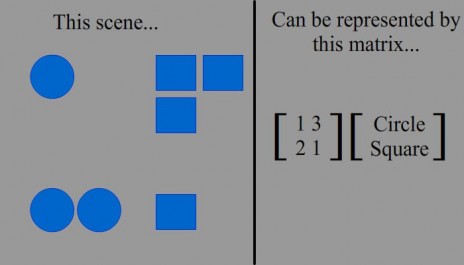Today, in the US education system kids are taught addition, subtraction, multiplication, division, and (for advanced students) basic algebra in Elementary School. In a way this makes sense. It provides everyone with the basic tools that they need to get through life. It lets them add times together, so they can organize their daily lives. It lets them balance a checkbook and calculate tips at restaurants.
But what if we started teaching kids advanced math concepts in elementary school? Vectors could be introduced at the same time as numbers. For example, you could teach that "5" represents 5 turtles, and [1 5] represents one turtle, and 5 apples. And that a vector like:
[1]
[5]
represents one turtle, followed by 5 turtles at another location.
Eventually you could introduce matrices:
[1 3]
[5 7]
And could visualize it as one area with one turtle and 3 apples, and another area with 5 turtles and 7 apples.
Then when you introduce addition, you could do it for matrices, and then just say that adding single numbers is like adding two 1 X 1 matrices.
Multiplying matrices is kind of complicated, so I don't know if you could teach it in elementary school, and even if you could, I don't know if they'd understand why it works:
[1 3] X [4 2] = [1*4 + 3*8 1*2 + 3*6] = [28 20]
[5 9] [8 6] [5*4 + 9*8 5*2 + 9*6] [92 64]
But it also makes multiplication very dynamic and interesting. And it allows one to look at a matrix as a transformation, and not a data set.

mikedood
holy christ im in high school and i have no idea wat a vector is lol. im gna go lick some bleach.
Al6200
Yeah, they're normally not taught until college. But in the 60s there was an experiment to teach set theory (normally pretty advanced undergraduate stuff) to elementary school kids, but it didn't work too well.